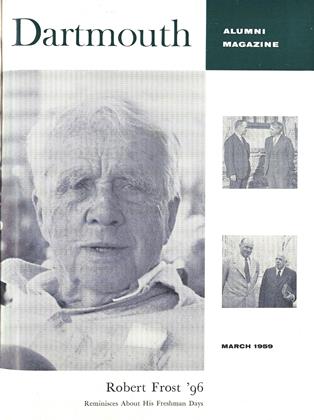GOOD news came to the College last month. A grant of $500,000 from the Alfred P. Sloan Foundation will enable Dartmouth to establish the Albert Bradley ('15) Center for Mathematics and Mathematical Research.
Mr. Bradley, whom the Center honors, is a long-time associate of Mr. Sloan, whom he succeeded as Chairman of the Board of the General Motors Corporation from 1956 to 1958. Mr. Bradley, a Dartmouth Trustee and a benefactor of the College in many ways over the years, has made a substantial personal gift toward the teaching and research unit that will bear his name.
In making its grant, the Sloan Foundation stated that it wished to assist Dartmouth in constructing a facility that would promote both teaching and research in the field of mathematics. The Albert Bradley Center will be housed in a new building planned to provide space also for the Department of Psychology. The building will be located near the corner of Elm and North Main Streets, in the general vicinity of the present Choate House. The Hanover architectural firm of E. H. and M. K. Hunter will design the building, for which preliminary studies are under way and plans will be ready this summer.
President Dickey, when he announced the Foundation gift last month, stated that both the $500,000 grant and Mr. Bradley's gift were made in recognition of the excellence of the Dartmouth mathematics program that Professor John G. Kemeny and his associates in the Mathematics Department have developed, with national influence and interest. In addition to the complete revamping and modernizing of undergraduate instruction in mathematics, Professor Kemeny, who is department chairman, and his colleagues have been engaged in mathematical research and in the writing of new textbooks, now being widely used.
Professor Kemeny, former assistant to Albert Einstein at the Institute for Advanced Study, came to Dartmouth from Princeton in the fall of 1954 with the rank of full professor. A philosopher as well as mathematician, he is the author of APhilosopher Looks at Science, recently published by Van Nostrand. Group research at Dartmouth recently has been devoted in part to mathematical methods in the behavioral sciences, supported by a grant from the National Science Foundation. Just last month this foundation made another grant to enable the Department, aided by two visiting mathematicians, to study probability theory.
 View Full Issue
View Full Issue
More From This Issue
-
 Feature
FeatureFRESHMAN DAYS...
March 1959 By EDWARD CONNERY LATHEM '51 -
 Feature
Feature"Spoiled Children" of Hanover: A Letter from Charles Doe, 1849
March 1959 By JOHN P. REID -
 Feature
FeatureSCHOOLMARMS, GRAMMARIANS and ANARCHISTS
March 1959 By ROBERT S. BURGER -
 Class Notes
Class Notes1918
March 1959 By THOMAS E. SHIRLEY, W. CURTIS GLOVER, RICHARD P. WHITE -
 Class Notes
Class Notes1950
March 1959 By SCOTT C. OLIN, SIMON J. MORAND III -
 Class Notes
Class Notes1926
March 1959 By ROBERT L. MAY, EDWARD J. HANLON, BRUCE W. EAKEN







